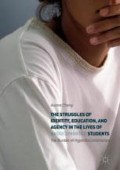Abstract
In this chapter, I further explore my positionality, moving from the personal to the academic as I discuss the tensions of what it means to be a “deserving” native researcher. In this way, I present my conceptual framework from which my writing stems and offer a theoretical situatedness as researcher. I begin by experimenting with the meaning of a borderland love ethic as a theoretical framework that centers on nurturing our strength to love in spaces of contention, tolerance of ambiguity as a revolutionary virtue, and humbly beginning anew again and again. Drawing from an extended interview with a participant of a larger study about undocumented students, I describe our positionalities with respect to privilege and undocumented status as the central foci. I use my own dilemma of understanding and reconciling my position as a once undocumented immigrant to a now hyperdocumented (Chang, Harvard Educational Review, 81(3), 508–520, 2011) native researcher, studying undocumented people, to work through the possibility of a borderland love ethic. Relying primarily on the theoretical works of Anzaldúa (Borderlands: La frontera—The new mestiza. San Francisco: Aunt Lute Books, 1987), Darder (Teaching as an act of love: Reflections on Paolo Freire and his contributions to our lives and our work. In A. Darder, M. Baltodano, & R. D. Torres (Eds.), The critical pedagogy reader. New York: Routledge, 2003), and hooks (All about love. New York: First Perennial, 2000). I ask how we as scholars enact love in our research amidst our seemingly contradictory positions of oppression and privilege. I contend that one possibility is by employing a borderland love ethic that embraces ambiguity, rejects binary positions, and humbly acknowledges our constant state of arriving, both as researchers and participants.
This article was originally published in 2015 and is reprinted with permission given by the publishers (Chang 2015).
Access this chapter
Tax calculation will be finalised at checkout
Purchases are for personal use only
References
Abrego, L. (2014). Sacrificing families: Navigating laws, labor and love across borders. Stanford: Stanford University Press.
Abu-Lughod, J. (1991). Writing against culture. In R. Fox (Ed.), Recapturing anthropology (pp. 466–479). Santa Fe: School of American Research Press.
Anzaldúa, G. (1987). Borderlands: La frontera—the new mestiza. San Francisco: Aunt Lute Books.
Chang, A. (2011). Undocumented to hyperdocumented: A jornada of protection, papers, and PhD status. Harvard Educational Review, 81(3), 508–520.
Chang, A. (2015). Privileged and undocumented: Toward a borderland love ethic. Association of American Educators, 9(2), 6–17.
Chavez, K. (2013). Queer migration politics: Activist rhetoric and coalitional possibilities. Chicago: University of Illinois Press.
Coll, K. (2004). Necesidades y Problemas: Immigrant Latina vernaculars of belonging, coalition and citizenship in San Francisco, California. Latino Studies, 2, 186–209.
Crenshaw, K. W. (1991). Mapping the margins: Intersectionality, identity politics, and violence against women of color. Stanford Law Review, 43(6), 1241–1299.
Darder, A. (2003). Teaching as an act of love: Reflections on Paolo Freire and his contributions to our lives and our work. In A. Darder, M. Baltodano, & R. D. Torres (Eds.), The critical pedagogy reader. New York: Routledge.
Dowbor, L. (1997). Preface to pedagogy of the heart by P. Freire. New York: Continuum.
Freire, P. (1993). Pedagogy of the city. New York: Continuum.
Freire, P. (1998). Pedagogy of freedom: Ethics, democracy, and civic courage. Lanham: Rowman and Littlefield.
Greenwood, D. J., & Levin, M. (1998). Reform of the social sciences and of universities through action research. In N. Denzin (Ed.), The handbook of qualitative research (Vol. 3, pp. 43–64). Thousand Oaks: Sage.
Gutiérrez y Muhs, G., Flores Niemann, Y., González, C. G., & Harris, A. (Eds.). (2012). Presumed incompetent: The intersections of race and class for women in academia. Boulder: University Press of Colorado.
Heidbrink, L. (2014). Migrant Youth, transnational families, and the state: Care and contested interests. Philadelphia: University of Pennsylvania Press.
hooks, b. (1994). Teaching to transgress. New York: Routledge.
hooks, b. (2000). All about love. New York: First Perennial.
Jacob, M. (2006). When a native “goes researcher”: Notes from the North American indigenous games. The American Behavioral Scientist, 50(4), 450–461.
King, Jr., M. L. (1957, November 7). Loving your enemies. Delivered at Dexter Avenue Baptist Church Montgomery, Alabama.
Narayan, K. (1993). How native is a “native” anthropologist? American Anthropological Association, 95(3), 671–686.
Negrón-Gonzales, G. (2014). Undocumented, unafraid and unapologetic: Re-articulatory practices and migrant youth “illegality”. Latino Studies, 12(2), 259–278.
Villenas, S. (1996). The colonizer/colonized Chicana ethnographer: Identity, marginalization, and co-optation in the field. Harvard Educational Review, 66(4), 711–731.
Zavella, P. (1996). Feminist insider dilemmas: Constructing ethnic identity with Chicana informants. In D. L. Wolf (Ed.), Feminist dilemmas in fieldwork (pp. 158–159). Boulder: Westview.
Zinn, M. B. (1979). Field research in minority communities: Ethical, methodological, and political observations by an insider. Social Problems, 27(2), 209–219.
Author information
Authors and Affiliations
Rights and permissions
Copyright information
© 2018 The Author(s)
About this chapter
Cite this chapter
Chang, A. (2018). Privileged and Undocumented: Toward a Borderland Love Ethic. In: The Struggles of Identity, Education, and Agency in the Lives of Undocumented Students. Palgrave Macmillan, Cham. https://doi.org/10.1007/978-3-319-64614-5_3
Download citation
DOI: https://doi.org/10.1007/978-3-319-64614-5_3
Published:
Publisher Name: Palgrave Macmillan, Cham
Print ISBN: 978-3-319-64613-8
Online ISBN: 978-3-319-64614-5
eBook Packages: EducationEducation (R0)

